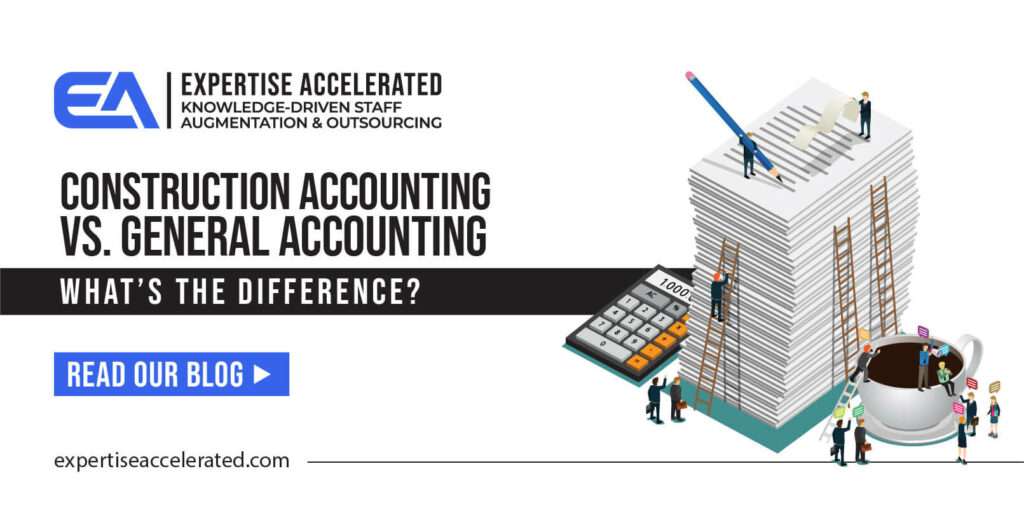Construction Accounting: Navigating Taxes and Expenses in the Construction Sector
Construction Accounting: Navigating Taxes and Expenses in the Construction Sector
Blog Article
Recognizing the Relevance of Building And Construction Accounting for Effective Task Administration

Duty of Construction Accounting
Building accountancy works as the foundation of monetary monitoring in the construction industry, ensuring that jobs are finished within spending plan and financial objectives are met. construction accounting. This specific audit strategy addresses the one-of-a-kind challenges dealt with in construction jobs, including differing task durations, fluctuating costs, and several stakeholders
One of the main roles of construction audit is to offer precise price evaluation and tracking throughout the job lifecycle. This facilitates educated decision-making, enabling project supervisors to adjust resources and timelines successfully. Additionally, building bookkeeping enhances cash circulation monitoring by keeping an eye on accounts payable and receivable, thus ensuring that funds are available for prompt settlements to providers and subcontractors.
Moreover, building accounting aids in compliance with industry policies and coverage needs. It furnishes job managers with the needed monetary information to prepare in-depth financial declarations, which are essential for audits and monetary reviews. By preserving clear documents, construction accountancy promotes openness and responsibility, critical parts in building depend on among stakeholders. Eventually, the function of building and construction audit extends past plain financial monitoring; it is integral to critical planning and operational efficiency, driving the success of building tasks in an affordable landscape.
Secret Parts of Construction Accounting

Budgeting establishes a monetary structure that guides task implementation, enabling managers to allot resources effectively and anticipate potential monetary obstacles. Accurate expense monitoring is essential for monitoring expenditures in real-time, aiding to recognize variations between predicted and real prices. This enables timely adjustments to maintain the job on spending plan.
Additionally, monetary coverage gives stakeholders with a clear photo of the task's monetary wellness. Normal reports, such as revenue and loss declarations and capital analyses, help with informed decision-making and improve openness among all celebrations involved.
Additionally, conformity with market guidelines and audit standards is crucial. This ensures that monetary methods are not just efficient however also authorized, securing the organization against legal effects. By integrating these essential elements, construction bookkeeping cultivates a structured approach to taking care of monetary sources, inevitably adding to the successful conclusion of construction tasks.
Advantages for Job Supervisors
Leveraging effective building audit methods provides task supervisors with a wide range of benefits that boost both operational performance and financial oversight. One considerable benefit is improved spending plan administration. Exact tracking of costs and profits permits project supervisors to check economic performance in real time, making certain jobs remain within spending plan and promoting timely changes when needed.
Furthermore, construction accountancy enhances capital administration, making it possible for job managers to enhance and expect economic requirements resource allocation. By recognizing cash money inflows and outflows, they can much better handle payments to workers, vendors, and subcontractors, thereby staying clear of pricey delays.
In addition, robust accounting systems provide extensive reporting capacities. Task managers can create reports that provide insights right into job productivity, cost variances, and source usage. This data-driven technique cultivates notified decision-making, permitting managers to determine potential problems proactively and carry out corrective procedures.
Last but not great site least, adherence to building accounting criteria makes sure conformity with lawful and regulative needs, lessening the threat of fines or disputes. Overall, reliable building and construction accounting furnishes task supervisors with the tools needed to drive task success, boost stakeholder confidence, and promote lasting business development.
Common Challenges in Construction Accountancy
Lots of task supervisors run into significant challenges in building and construction audit that can impede project success. One of the key challenges is the intricacy of tracking multiple work websites, each with distinct budgets, timelines, and source appropriations. This needs thorough interest to information, which can be overwhelming without a durable accountancy system in position.
Furthermore, rising and fall product prices and labor rates can make complex budget monitoring, making exact projecting difficult. Task managers typically battle to integrate these expenses with actual expenditures, resulting in potential monetary disparities.
In addition, construction accountancy involves conformity with different regulations, including tax responsibilities and labor regulations. Browsing these policies can be difficult, specifically for supervisors that may not have a strong audit history.
Another substantial obstacle is managing capital, which is vital in the construction industry. Hold-ups in invoicing, repayments from customers, or unexpected job modifications can produce capital lacks, endangering the job's progress.
Lastly, efficient interaction between task supervisors, accounting professionals, and field teams is important. Misunderstandings can lead to incorrect financial reporting, additionally making complex job administration initiatives. Dealing with these obstacles proactively is important for successful construction accountancy.

Best Practices for Effective Accountancy
While browsing the complexities of building audit can be challenging, adopting finest practices can considerably boost financial management and task success. One essential method is keeping precise and prompt records. Executing robust bookkeeping software application customized to building jobs can enhance data entrance, invoicing, and reporting, decreasing mistakes and conserving time.
In addition, establishing a clear spending plan and normal monitoring versus this budget plan are critical. Utilizing a system of routine financial evaluations allows project supervisors to recognize differences early, facilitating prompt decision-making. It is likewise important to separate task prices into direct and indirect classifications, making it possible for more clear understandings right into productivity.
An additional best technique includes cultivating open communication among all stakeholders. Normal updates and joint conversations concerning monetary condition can guarantee everybody is straightened and educated. Training team in construction-specific audit concepts even more improves competency and precision.
Last but not least, making certain compliance with appropriate audit requirements and laws is non-negotiable. Routine audits and internal testimonials add to transparency and responsibility, building count on with customers and stakeholders. By concentrating on these best methods, building firms can optimize their bookkeeping procedures, ultimately driving project success and financial stability.
Conclusion
To conclude, building audit plays a critical role in ensuring effective task monitoring by facilitating accurate financial oversight and improving decision-making. By incorporating crucial elements such as cost estimate, capital management, and compliance, task supervisors can browse common obstacles and leverage ideal practices for efficient accounting. Eventually, a robust construction accounting structure not only safeguards budget stability however also contributes to the overall economic health and wellness of construction projects, cultivating lasting success within the industry.
By incorporating these vital components, useful content building and construction bookkeeping fosters a structured technique to managing financial sources, ultimately contributing to the effective conclusion of building Your Domain Name jobs.
Exact tracking of expenses and revenues permits task supervisors to monitor monetary performance in actual time, making certain jobs stay within budget plan and promoting prompt changes when necessary.
Job supervisors can produce reports that offer understandings into project earnings, cost variances, and source use.Lots of task supervisors encounter substantial difficulties in building audit that can hinder project success. construction accounting. Ultimately, a durable building and construction audit structure not just safeguards budget integrity yet also adds to the total monetary health and wellness of building projects, promoting sustainable success within the industry
Report this page